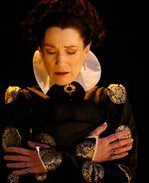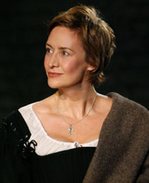SEARCH
REVIEWS
FEATURES
NEWS
Etcetera and
Short Term Listings
LISTINGS
Broadway
Off-Broadway
BOOKS and CDs
OTHER PLACES
Berkshires
London
LA/San Diego
Philadelphia
Elsewhere
QUOTES
On TKTS
LETTERS TO EDITOR
FILM
LINKS
MISCELLANEOUS
Free Updates
Masthead
Writing for us
A CurtainUp Review
Mary Stuart
|
Mary Stuart Moves to Broadway Moves to Broadway— Same Queens, but a New Entourage
By Elyse Sommer
Charlotte Loveridge's Review of the London Production
Broadway audiences rejoice. Janet McTeer, who won the Tony for her last Broadway appearance eleven years ago as a highly original Nora in Ibsen's Doll's House, is back on Broadway and you couldn't ask for a more regal and steadfast Queen of Scots. Like the famously doomed Scottish queen, McTeer is tall and stately (Mary was 5 foot 11 inches, a remarkable height for a 16th Century woman), and embodies both the thrice married queen's sensuality and religiosity. And for double rejoicing, Harriet Walters, whose Queen Elizabeth made this new version of Schiller's Mary Stuart a double-diva triumph, first at London's Donmar and later at the Apollo Theatre, has crossed the pond with her. Naturally, it's the chance to see these two British stage divas in one of history's most famous high stakes family feuds that is the ticket buying draw. However, while Mary Stuart is, above all, an extraordinary showcase for the two leading ladies, there are also ample bravura acting opportunities for the supporting players. Under Phyllida Lloyd's firm direction the fact that McTeer's Mary and Walters' Elizabeth are now surrounded by an American cast of advisers, supporters and double dealers has not diminished the overall strength of her innovatively staged new version of Friedrich Schiller's 1800 history-based, if not entirely historically accurate, tragedy. There's strength and cohesiveness in the entire company, and without any of the awkward straining for authentic accents that often weakens transfers of British plays without their complete original casts. This production sticks to the essential plot: the personal struggle between the devoutly Catholic Mary, Queen of Scots, and her Protestant cousin Queen Elizabeth, whose response to Mary's plea for protection after being forced to abdicate her throne was to imprison her for 19 years in Fotheringay Castle, bereft of royal comforts as well as the means to practice her religion. The action focuses on the days before Mary's execution, with Elizabeth's advisers, risking their own futures to argue its pros and cons to the notoriously indecisive queen (a trait for which she was as noted as she was for her brilliance). However, Peter Oswald's accessible interpretation and Lloyd's starkly dramatic staging ramp up the ever pertinent machinations in the corridors of power. Lloyd has given Schiller's 200-year-old play the sensibility of a modern political thriller. Her vision is strongly supported by Hugh Vanstone's cinematic lighting and Anthony Ward's brilliant costume design — the men wearing dark business suits (shades of modern politicians, especially ex-President George W. Bush's circle of power brokers), but with the two queens in period costumes to anchor them to their historic roots. The visual impact of Elizabeth always having some of these men in suits nearby is at its most dramatic in the scene where the two Queens finally meet: Mary, undeterred by a rainstorm that drenches her and her faithful nurse Hanna Kennedy (Maria Tucci) is ecstatic to be allowed outside her Fotheringay prison. The unannounced arrival of Elizabeth and her umbrella toting entourage brings that marvelous bit of stage wizardry to a striking end. Oswald's text occasionally leans a bit heavily on contemporary expressions ("your royal highness" is twittered down to just plain "Queen" . . . a scheme for finding someone to quietly kill off Mary is likened to "a hot potato being dropped into a clean pair of hands". . . Mary's prison guardian Paulet warn his nephew, the fiery Catholic convert Mortimer that he's " on slippery ground." But the translation suits Lloyd's vision and it does not stint on rich, impassioned dialogue and soliloquies. McTeer's tackles the stages of the title character's final days and hours with awesome forcefulness. One can't help wondering how even a classically trained actor can keep her voice strong enough for a week-long schedule of ranting about the bonds of her imprisonment and her guilt over her messy personal past (she feels responsible for her third husband's part in the murder of her second). Walters too is striking as a steely monarch, insecure about her hold on the throne, and always conscious that even a queen is a lone woman in a male-dominated world which makes her more than a little envious of her cousin's more adventurous personal life (All other women/Are free to raise the men they love-but I/Cannot do that. I am not like the Stuart,/Who gave herself exactly what she wanted./Denied herself no pleasure, drunk a river/Of bliss!) Like Mary, her Elizabeth changes before our eyes, quite funny and flirtatious initially, torn by indecision in the face of conflicting advice, and finally the bitter defeat and loneliness that comes with her being rid of Mary. But much of the tension and theatricality of this battle royal depends on the actors aiding and counseling the Queens. As I've already stated, the thespianss enlisted for the Broadway productions, give commendable performances. It's easy to see Mary's rage and Elizabeth's indecisiveness exacerbated by Nicholas Woodeson's ruthlessly pragmatic Lord Burleigh. On the other hand, you can understand the emotional hold on both by John Benjamin Hickey's comically effete and emotionally see-sawing Earl of Leicester. Chandler Williams makes his mark as young Mortimer; so does Michael Countryman as his uncle and Mary's morally upright, stern jailer. Also praiseworthy are Maria Tucci as Mary's nurse, Brian Murray as the wise but ultimately tired of the political gamesmanship Earl of Shrewbury, and Robert Stanton as Sir William Davison, the unfortunate political novice who misreads Elizabeth's instructions about what to do with the signed order for Mary's execution. The gorgeous red gown that McTeer wears on her way to the scaffold is patterned on the real Mary's dropping her black cloak to reveal a crimson dress when she reached the beheading block. That costume and the play's many other fact-inspired elements notwithstanding, Schiller, a history professor, was as fearless about playing with facts in the interest of a good story as these actors are in playing the parts assigned to them to the hilt The meeting between Mary and Elizabeth at Fotheringay never took place but, as presented here, it's not one you'll want to miss seeing. Broadway Production Notes Friedrich Schiller's Mary Stuart, a new version by Peter Oswald Directed by Phyllida Lloyd Cast: Janet McTeer (Mary Stuart, Queen of Scotland) and Harriet Walter (Elizabeth, Queen of England), Michael Countryman (Sir Amias Paulet), Adam Greer (O'Kelly & others), John Benjamin Hickey (Robert Dudley, Earl of Leicester), Michael Rudko(Count Aubespine/Melvil), Robert Stanton (Sir William Davison), Maria Tucci (Hanna Kennedy), Chandler Williams (Mortimer), Nicholas Woodeson (Lord Burleigh), Brian Murray (George Talbot, Earl of Shrewsbury); Tony Carlin, Guy Paul (Courtiers, officers & others) Scenic & CostumeDesign: Anthony Ward Lighting: Hugh Vanstone Sound: Paul Arditti Stage Manager: Barclay Stiff Broadhurst Theatre 235 West 44th Street 212-239-6200 From 3/30/09; opening 4/19/09; closing 8/16/09 Tickets: $69.50-$116.50. Tuesday through Saturday at 8:00 PM, with matinees Wednesday and Saturday at 2:00 PM, Sunday at 3:00 PM. Reviewed by Elyse Sommer at 4/18/09 press preview Charlotte Loveridge's Review of the London Production REVIEW FEEDBACK Highlight one of the responses below and click "copy" or"CTRL+C"
Paste the highlighted text into the subject line (CTRL+ V): Feel free to add detailed comments in the body of the email. . .also the names and emails of any friends to whom you'd like us to forward a copy of this review. |
Charlotte Loveridge's Review of the London Production
|
Everyone judges by appearances, no one bothers to fathom the realities.
---- Elizabeth |
The relationship between the regal cousins Mary Queen of Scots and Elizabeth I has always fascinated artistic interpretation. Schiller's 1800 play might tweak historical accuracy into a more satisfying aesthetic, but it portrays precisely the tense balance between the two women, who are so similar in situation but whose interests are doomed to be in conflict. Elizabeth's security is threatened by the survival of the Catholic Mary, but her popularity and conscience are endangered by the forceful removal of her problematic cousin. Modern society is no stranger to the perils of religious extremism, but Peter Oswald's lucid, pacy translation wisely does not emphasize this.
Janet McTeer gives a commanding performance as Mary. Able to evince sincerity and versatility, she charts Mary's journey from a penitent prisoner, ridden with guilt for her complicity in her husband Darnley's murder, into regal composure and inner peace as she ascends the scaffold. Elizabeth (in a crisply expert performance from Harriet Walter), follows an identical but opposite path. She begins hailed by sycophantically applauding crowds, in control of her court, ironic, flirtatious and manipulative. However, she is increasingly betrayed, alone and trapped by her office. She bemoans: "Slave to my own free people - oh appalling servitude".
The pivotal meeting scene between the two women, with its notorious breach of history, is the crux of the play's shifting power dynamics. The stage is suddenly flooded with pouring rain. Mary, bare-footed and drenched, is glorying in the freedom of the open air. Elizabeth, on the other hand, is protected from the downpour by an umbrella-carrying band but not from Mary's ascendant scorn. The English queen's humiliation catalyses the tragedy.
The design cleverly draws out the thematic heart of the text. The set is uncluttered and starkly lit. Little differentiates Mary's prison chamber from Elizabeth's seat of power. While the male court are dressed in modern political suits, the two women alone are in period costume. They are historical figures, but their relevance extends to today. They are clearly isolated and in their heavy, unwieldy dresses the encumbrance of being female in what is essentially a male world is shown. Moreover, reflecting their parallel journeys, Elizabeth's queenly finery of gold-embossed suns on a black satin dress is replaced by a drab, everyday covering. Mary, on the other hand, wears a brown dress while languishing in guilt and in prison, but dons velvet and jewels, when, with her soul cleansed, she walks to her death.
The rest of the cast are excellent. In particular, Guy Henry is superb as the arch politician, schemer, courtier and would-be lover Robert Dudley, the Earl of Leicester. David Horovitch chillingly portrays Lord Burleigh's realpolitik and "blood-stained kind of wisdom". Michael Simkins is the moderate, scrupulous Sir Amias Paulet and Rory Kinnear his impassioned nephew, the Catholic fanatic Mortimer.
This is a charged, intense and darkly energetic production of a classic play with an inverted tragedy. The seeming victor is defeated in all but appearance, whilst the downtrodden, executed protagonist enjoys martyred salvation. With individuals trapped and morally disfigured by their public roles and a veritable nexus of self-seeking conspiracies, this is fine quality Schiller.
Reviewed by Charlotte Loveridge in 2005, at 19th of October performance at the Apollo Theatre, Shaftesbury Avenue, London where it played through January 2006 London Cast: Janet McTeer, Harriet Walter, Guy Henry
With: June Watson, Michael Simkins, Rory Kinnear, David Horovitch, Tam Dean Burn, Paul Jesson, Stephen Fletcher, Rufus Wright.
Try onlineseats.com for great seats to
Wicked
Jersey Boys
The Little Mermaid
Lion King
Shrek The Musical

South Pacific

In the Heights

Playbill 2007-08 Yearbook

Leonard Maltin's 2008 Movie Guide


Wicked
Jersey Boys
The Little Mermaid
Lion King
Shrek The Musical

South Pacific

In the Heights

Playbill 2007-08 Yearbook

Leonard Maltin's 2008 Movie Guide




